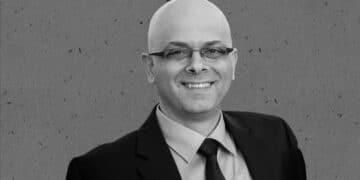Head of the First Terrorism Circuit of the Cairo Criminal Court
Judge Mohammed Sherin Fahmy is responsible for the unlawful prosecution of many Egyptians for peaceful activism, protected by international human rights law.
Fahmy has presided over the trials of numerous dissidents, prosecuted for their peaceful speech, expression, and association or political activism in general. He used vaguely worded and overly broad "anti-terrorism" laws to keep these peaceful activists in extended and unlawful pretrial detention.
"Judge Mohammed Sherin Fahmy is an integral part of the Egyptian government's crackdown on civil society, political pluralism and intellectual openness," said DAWN Executive Director Sarah Leah Whitson. "He has weaponized anti-terrorism laws to crush opposition to Egypt's tyrannical government."
Fahmy repeatedly issued orders that extended the pre-trial detentions of political detainees Walid Shawky, Ibrahim Ezz el-Din, and Solafa Magdy Sallam, prosecuted for their peaceful speech and activism, even though no evidence was presented to establish any of the statutory conditions for pre-trial detention as stipulated in Article 134 of Egypt's Code of Criminal Procedure. Fahmy ordered these detainees to remain in pretrial detention without providing reasons for his decision, as required by Egyptian domestic law and international standards of due process.
In some instances, Fahmy extended pretrial detention without giving the detainees or their lawyers a meaningful chance to be present and make arguments, in violation of Egyptian domestic law and international human rights law.
Fahmy's decisions have impacted not just defendants but also their families. When Fahmy decided to keep Solafa Sallam and her husband, Hossam el-Sayyad, in extended pre-trial detention, for their peaceful journalistic writing, in violation of Egypt's Code of Criminal Procedure (Article 488) and Child Law as well as Article 3 (1) of the UN Convention on the Rights of the Child, he deprived their 7-year old son, Khaled, of both his parents.
Fahmy also took part in prosecuting Egyptian politicians and opposition leaders. He presided over the trial of the late president Mohamed Morsi, whom the current Egyptian regime deposed. Fahmy frequently screamed at President Morsi.
In one session, he ordered him to "Shut up! I do not want to hear a voice." On June 17, 2019, Morsi died in the courtroom before Fahmy who, according to a detailed statement from the Egyptian Front for Human Rights, played a deliberate role "in the slow killing of Mursi", including by ignoring his complaints about inhumane treatment in prison, insisting on a punishingly rigorous trial schedule and denying him medical care.
Fahmy also shares responsibility for the death of Mahdy Akif, the former Supreme Leader of the Muslim Brotherhood, who died in pre-trial detention at the age of 89, after Fahmy ignored multiple medical reports that Akif's pancreatic cancer necessitated his release.
On October 12, 2014, Fahmy sentenced Essam Sultan, former Member of Parliament and Deputy President of the Islamist al-Wasat party, to one year in prison with labor for insulting the judiciary during a trial widely viewed as politically-motivated. The conviction came after Sultan, upon entering the courtroom, saluted the attendants with a traditional greeting: "Peace be upon you," to which Fahmy responded: "The court is not to be greeted." When Sultan replied: "Then, peace be upon you all, except the court," Fahmy considered these words an insult to the court and punished Sultan.
On April 12, 2014, Fahmy sentenced Hazem Salah Abu Ismail, founder of the Salafist al-Rayah party, to one year in prison with labor for allegedly insulting the Egyptian judiciary. The conviction came after Abu Ismail criticized the fairness of the trial over his alleged concealment of his mother's U.S. citizenship, in order to qualify as a presidential candidate in 2012, and after Abu Ismail refused representation by the court-appointed defense lawyer. Four days later, Fahmy found Abu Ismail guilty of concealing his mother's U.S. citizenship and sentenced him to seven years in prison with labor.
The regime-controlled media, such as the state-run Akhbar Elyoum and the privately-owned Sada Elbalad, described Fahmy as the "Knight of Right and Law," whose "decisiveness" and "assertiveness" reflect how an ideal judge should act.
"Fahmy's abuses include locking up a journalist for writing about people with disabilities and an urban planner for imagining the architecture of social justice," Whitson said. "He should enforce anti-terrorism laws against those who threaten security – not those who peacefully argue for inclusivity and justice."
Fahmy descends from a powerful military family and is the son-in-law of a former head of Egypt's notorious State Security Investigations Service (renamed the National Security Agency in 2011). After his graduation from the Faculty of Law at Cairo University, Mohammed Sherin Fahmy joined the public prosecution as Deputy Attorney General in Assiut Governorate, South Egypt. After that, he ascended the professional ladder to occupy leading prosecutorial positions such as the Head of the Supreme Public Funds Prosecution and the Attorney General of East Cairo Prosecution. Between 1999 and 2005, Fahmy worked with the State Security Affairs Office. In 2006, Fahmy joined the Cairo Criminal Court.
On September 23, 2020, DAWN requested a response from Fahmy by writing to the Egyptian government, but no response has been received.
Tell Fahmy to stop abusing the due process rights of peaceful activists. Write to him at the Egyptian Judges Club on Facebook, or the Egyptian Ministry of Justice on Twitter.
Watch the video of Fahmy here.
Media error: Format(s) not supported or source(s) not found
Download File: https://dawnmena.org/wp-content/uploads/2021/06/Mohammed-Sherin-Fahmy-En.mp4?_=1About DAWN's culprit gallery:
Tyrants need enablers who will implement their oppressive practices, even if it means abusing their fellow citizens. These agents often mask their complicity in the guise of professionals exercising their duties in offices, courtrooms, police stations, and interrogation rooms.
DAWN seeks to disclose the identity of the state agents who enable repression and to make them recognizable at home and abroad. These individuals, whom DAWN calls "culprits," bear administrative, civil, moral, legal, and/or political responsibility for human rights and international humanitarian law violations.







































